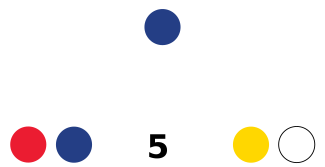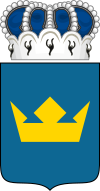September 2019 Atovian parliamentary election
| ||||||||||||||||||||||||||||||||||||||||||||||||||||||||||||||||||||||||||
All 5 seats in the House of Commons 3 seats needed for a majority | ||||||||||||||||||||||||||||||||||||||||||||||||||||||||||||||||||||||||||
|---|---|---|---|---|---|---|---|---|---|---|---|---|---|---|---|---|---|---|---|---|---|---|---|---|---|---|---|---|---|---|---|---|---|---|---|---|---|---|---|---|---|---|---|---|---|---|---|---|---|---|---|---|---|---|---|---|---|---|---|---|---|---|---|---|---|---|---|---|---|---|---|---|---|---|
| Turnout | 50.0% ▼ 13.6 pp | |||||||||||||||||||||||||||||||||||||||||||||||||||||||||||||||||||||||||
| ||||||||||||||||||||||||||||||||||||||||||||||||||||||||||||||||||||||||||
| ||||||||||||||||||||||||||||||||||||||||||||||||||||||||||||||||||||||||||
The 2nd Atovian parliamentary election was held from the 2nd until the 6th of September 2019 after the writs were issued by King Connor I to elect members of the House of Commons. Prime Minister Thomas Bainbridge called upon a snap general election and was eventually approved by the House of Commons.
This was the first time that the Conservative Party, led by Erich Thaller, and the Libertarian Party, led by the Chancellor Richard von Dalton, were participating in a national election. The previous election saw the New Democratic Party control two out of the three available seats in the House of Commons. Eventually, the Conservative Party gained the vacant seat available and managed to gain two seats on May 2019 but reverted back to one seat again on June 2019.
The election saw the Conservative Party as the largest party in the House of Commons, receiving 50% of the total votes, and putting the second place to the New Democratic Party, which lost a seat and received only 33% of the popular vote. The Libertarian Party gained its first-ever seat, with the Chancellor Richard von Dalton being allowed to take and accept his seat. Turnout was 50%, a decrease from the previous election.
Background
This section is empty. You can help by adding to it. (July 2023) |
Campaign
New Democratic Party
Conservative Party
Libertarian Party
Parties
This section is empty. You can help by adding to it. (July 2023) |
Results

| ||||||||
|---|---|---|---|---|---|---|---|---|
| Party | Votes | % | Swing (pp) |
Seats | Change (seats) | |||
| Conservative Party | 3 | 50.0 | +50.0 | 2 | ▲ 1 | |||
| New Democratic Party | 2 | 33.3 | -38.1 | 1 | ▼ 1 | |||
| Libertarian Party | 1 | 16.7 | +16.7 | 1 | ▲ 1 | |||
| None of These Candidates | 0 | 0.0 | -28.6 | 1 | ▲ 1 | |||
| Total | 6 | 100.0 | – | 5 | ▲ 2 | |||
| Invalid/blank votes/vacant | 0 | 0.0 | – | 1 | – | |||
| Registered voters/turnout | 12 | 50.0 | -13.6 | – | – | |||
| Source: Ministry of Internal Affairs | ||||||||
Aftermath
Stephen Freayth was elected as the new Speaker of the House of Commons on 5 October 2019, taking over from King Connor I as the presiding officer and head of the legislature.
No party received a majority in the House, with the Conservative Party taking the plurality of the seats. Prime Minister Thomas Bainbridge remained in a caretaker capacity until he was able to form a government. The Conservative Party was approached by the Prime Minister to form a coalition government as it had been on the previous government, but the leader of the Conservatives Erich Thaller rejected it.
The lone vacant seat from the election was finally filled in a by-election, which resulted on the election of Newton von Uberquie from the Left-Green Movement. Bainbridge eventually formed a coalition government between the New Democrats, the Libertarians and the Left-Greens, with Uberquie taking the office of Deputy Prime Minister.




